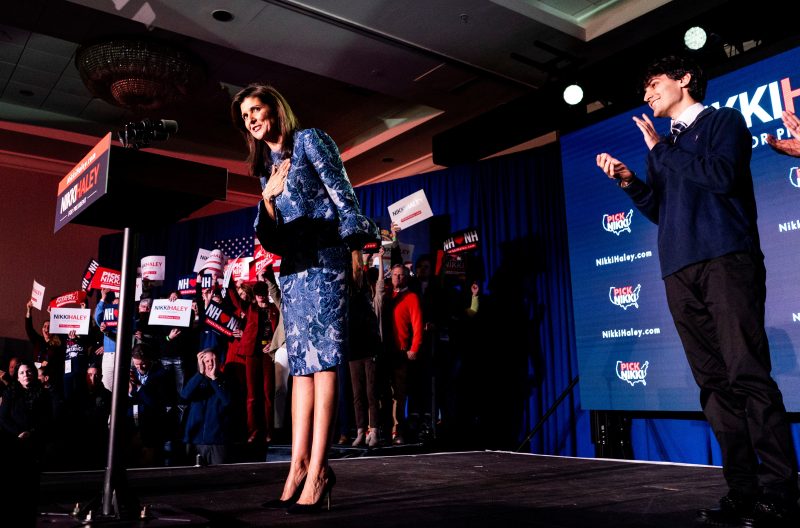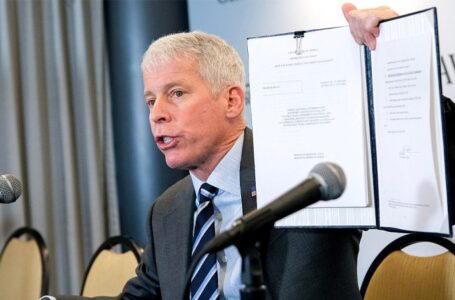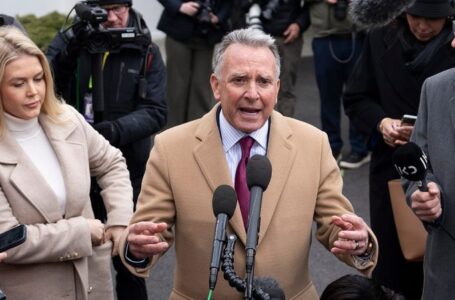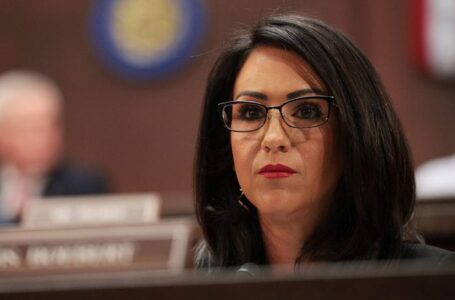Indonesian TikToker jailed for blasphemy for telling Jesus to get a haircut
Haley faces uphill odds as GOP race goes to South Carolina


MANCHESTER, N.H — Nikki Haley’s underdog campaign against Donald Trump for the GOP nomination next ventures to surprisingly unfriendly territory: her home state.
Haley pledged to stay in the 2024 primary after Trump romped to a second primary victory on Tuesday night, winning New Hampshire by 11 percentage points with nearly 86 percent of the vote tallied. Trump on Tuesday night ridiculed Haley’s performance as fellow Republicans rallied behind him, boosting his formidable advantages ahead of the South Carolina primary.
Speaking to supporters at a watch party on Tuesday night, the former South Carolina governor acknowledged Trump’s win and said “he earned it.”
“New Hampshire is first in the nation. It is not the last in the nation. This race is far from over,” Haley said, adding later: “But South Carolina voters don’t want a coronation. They want an election. And we’re going to give them one because we are just getting started.”
Leading South Carolina Republicans have largely lined up behind Trump in the state Haley once led for six years, fighting her way to the top from obscurity and clashing with many in the state. South Carolina has embraced Trump enthusiastically since 2016, making it risky for Haley to take her campaign to the place she governed from 2011 to 2017, according to more than a dozen advisers, donors, allies and longtime South Carolina political observers.
“She does not want to lose her home state,” said Doug Deason, a major GOP donor who has given to Haley. “It’s hurtful to lose your state. Imagine now, she runs in 2028, that would be the things that Ron DeSantis and other candidates used against her, that you can’t even win your own state.”
While there has been little reliable polling in South Carolina ahead of the Feb. 24 primary, many operatives and even some Haley allies expect Trump to clear 50 percent there. In a bid to get her to drop out, Trump’s campaign has tried not-so-subtly to show Haley that a campaign in South Carolina would be painful for her. The Trump campaign brought a phalanx of elected officials — including the state’s governor, a senator she appointed and other lawmakers she once considered friends — to New Hampshire to campaign for Trump.
One of them, former 2024 rival Sen. Tim Scott (R-S.C.), stood behind Trump as he gave his victory speech on Tuesday. Trump told Scott that he must hate Haley not to endorse her and mocked her for trailing in South Carolina even though she was once governor. “I just love you!” Scott said, jumping in.
Trump plans to bombard her with attacks in South Carolina, where they are determined to end the primary. Among the things they plan to focus on include her record on immigration, her past praise of China for sending jobs to South Carolina, her call to raise the retirement age for some younger people and her considerable number of enemies in the state, advisers say.
“Those who know her the best like her the least,” said Chris LaCivita, a top adviser to Trump. “Her record as governor is going to be in the forefront of our message.”
Haley, meanwhile, is hitting the trail in South Carolina immediately after New Hampshire’s primary.
Her Charleston, S.C.-based campaign has announced plans for a $4 million ad blitz in the state starting the same day and disputed the idea that a Trump victory in New Hampshire effectively ends the primary. Haley on Tuesday morning reiterated that she is in the race for the long haul, telling reporters at a polling station in Hampton: “We’re going to South Carolina. … This has always been a marathon, it’s never been a sprint.”
Campaign manager Betsy Ankney noted that anyone can vote in South Carolina’s GOP primary, unless they have already cast a ballot in the Democratic one, meaning the independent voters and even Democrats who boosted Haley in New Hampshire could again have an impact. She pointed ahead to numerous Super Tuesday states where primaries are not limited to party members and where she argued the demographics are favorable for Haley.
“South Carolinians first elected Nikki when she was the anti-establishment, conservative candidate for governor. She signed pro-life legislation, cracked down on illegal immigration, turned South Carolina into an economic powerhouse, and took on both parties over spending and transparency issues. They know she has what it takes to win because they’ve seen her beat the odds before — not just once, but twice — and she’s going to fight to earn their votes again,” Haley spokeswoman Olivia Perez-Cubas said in a statement to The Washington Post.
Katon Dawson, a former South Carolina GOP chairman who serves as a prominent surrogate in South Carolina for Haley, said her team in the state was ready for a knife fight and would have the money and people. Dawson said he knew Haley was trailing Trump in the state, “but I don’t care about the data in the state right now. He’s got a grip on 41 percent of the electorate. Can we expand the map?”
Dawson, a veteran of the state’s bare-knuckle politics, said he could envision ads that featured a picture of Trump and Jeffrey Epstein together, along with touting Trump’s previous support for Democrats such as Bill Clinton. So far, he conceded, most attacks against Trump had not worked in the GOP primary, but “three weeks is an eternity in politics,” and Republicans needed to be reminded of Trump’s considerable baggage, such as his bankruptcies and felony charges.
People close to Haley said to expect her to ratchet up her attacks against Trump, knowing she is an underdog.
“Trump looks like the inevitability in South Carolina, and he might be. I’m not discouraged, but we are running against an 800-pound gorilla who spends a lot of time in a tanning booth,” Dawson said. “I remember three weeks before the gubernatorial primary, Nikki Haley had 3.5 percent, and I thought, Lord, I told Nikki not to do this, I told her to do something else. All of a sudden, she put $1 million on TV and Sarah Palin rolled into town, and Nikki had a message.”
Rob Godfrey, her former spokesman, said the avalanche of endorsements against her from politicos she had known the longest was not likely to dissuade Haley.
“The more people pile on her, the more people attack her, the more people endorse against her, the more motivated she is to keep fighting,” Godfrey said.
Haley allies acknowledge that she has made enemies in South Carolina but call it a testament to her willingness to ruffle feathers.
“She was never an insider, she was never somebody that went along to get along,” said Tom Davis (R), a South Carolina state senator, who supports Haley.
Now, he said, Haley has a month to remind South Carolinians of what he views as big successes during her tenure — the drop in unemployment, the decreased small-business taxes, the voter ID legislation and the mandatory use of eVerify to crack down on undocumented immigration.
Haley was governor until 2017, when Trump plucked her to make her the U.N. ambassador. Operatives in the state long speculated that Trump only picked her for the job because he wanted to reward Lt. Gov Henry McMaster, who endorsed him early, by making him governor. Trump later publicly said that was the case.
Haley has vacillated on Trump, attacking him in 2016 and backing Marco Rubio; praising him in 2017 and 2018 while working for him; criticizing him after the attack on the U.S. Capitol on Jan. 6, 2021, and saying he would never run for federal office again; praising him later in 2022 and vowing not to run against him, to then becoming Trump’s first major GOP challenger in 2023. Throughout her campaign, she has sharpened her argument that “rightly or wrongly, chaos follows” Trump, and she has increasingly attacked him as too old to run for office.
After leaving the United Nations in New York in 2018, Haley returned to South Carolina and bought a mansion on Kiawah Island. She often posts about the state, attending Clemson University football games as an alumnus, or her runs through the bucolic island near Charleston. She was a state lawmaker before becoming governor and often talks of growing up as an Indian American girl in Bamberg, S.C., where she was disqualified from a beauty pageant because of her skin color.
She was generally popular during her time as governor — the biggest national moment of her term was her response to the mass shooting at Emanuel African Methodist Episcopal Church in Charleston. But many of the state’s most conservative voters were always skeptical of her, particularly in upstate South Carolina. Her star has since faded for some in the state, and Trump remains deeply loved in South Carolina, operatives say.
“I don’t think she’s got a shot in hell,” said Wesley Donehue, the founder of a South Carolina-based digital firm who previously worked for rival candidate Vivek Ramaswamy. “… She’s gonna go into her home state and be trounced. I see absolutely no path forward.”
As for Trump, Donehue said: “These are his people. … South Carolinians love the Trump attitude.”
People who knew Haley longest said she did not necessarily connect with the current version of the Republican base and Trump’s MAGA movement.
Haley is popular among more educated enclaves in South Carolina, which have been populated with Fortune 500 companies and booming urban development. Outside of those areas, one longtime ally said she is likely to struggle mightily because she was a “Chamber of Commerce-style governor at the end of the Chamber of Commerce Republican Party.”
Alex Stroman, a former executive director of the South Carolina GOP, has long said that Palmetto State voters “aren’t going to reward a candidate just for being from South Carolina.” He noted that Trump has massive “institutional support” from elected endorsers and top team members familiar with South Carolina.
Trump added endorsements this past week from Reps. Nancy Mace (R-S.C.) and Rep. Jeff Duncan (R-S.C.). Their backing means that all but one member of the South Carolina congressional delegation is now behind him.
“At the end of the day, anyone looking to topple him — it’s going to be a David-versus-Goliath situation. But if you remember that story, David was able to do it,” Stroman said. He added that he’s channeling the South Carolina motto “Dum Spiro Spero,” which translates to: “While I breathe, I hope.”
Dylan Wells and Maeve Reston contributed to this report.











